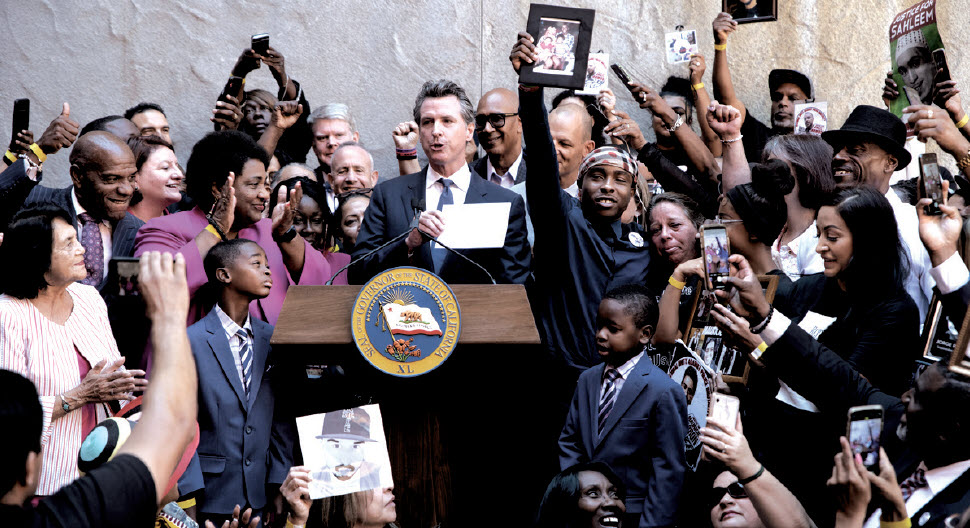Crime
California Now Has One of the Strongest Police Use-of-Force Laws in the Country

Thanks to the “Moral Strength” of Black Legislative Caucus Chair Shirley Weber Who Led Effort
On Monday, Gov. Gavin Newsom signed into law one of the strongest measures in the country intended to deter police officers from killing civilians while pursuing criminal suspects.
After a grueling yearlong process that survived bitter fights, tense negotiations and impassioned speeches, on July 18 the Senate voted 29-1 to pass AB 392, the California Act to Save Lives.
In May, law enforcement organizations, once staunch opponents of the bill, held a private meeting with the governor and members of the Legislature and reached common ground on some of the language in the legislation. Advocates of the bill said those amendments helped the bill gain wider support among members of the Assembly and Senate, many of whom were strongly opposed when the proposal was first introduced.
Assemblymember Shirley Weber (D-San Diego) introduced the legislation she co-authored with Assemblymember Kevin McCarty (D- Sacramento). Both lawmakers are African American.
Inspired, in part, by the 2018 shooting of Stephon Alonzo Clark, an unarmed 22-year-old African-American man, by police in Sacramento, the bill proposes changes to California’s penal code regarding “justifiable homicides” by “peace officers.” Its language requires cops to only use deadly force “in defense of human life” when a suspect poses an “imminent threat of death or serious bodily injury to themselves or others.”
Senate Pro Tem Toni Atkins (D-San Diego) championed the bill in the Senate.
“With so many unnecessary deaths, I think everyone agrees that we need to change how deadly force is used in California,” said Weber, who is also chair of the California Legislative Black Caucus. “We can now move a policy forward that will save lives and change the culture of policing in California.”
The bill, which was initially sponsored by the civil justice group Black Lives Matter (BLM), also calls for police officers to rely on training and exhaust all resources available to them, whenever possible, before shooting to kill. The bill defines “imminent harm” as a threat that must be “instantly confronted.” It rules out fear of future harm — no matter how great or likely the potential danger is.
In April, the “Act to Save Lives” cleared its first hurdle when the Assembly Public Safety Committee voted 5-2 in favor of the legislation.
Shortly after, state law enforcement groups —including the California Highway Patrol, the Peace Officers Research Association of California and the California State Sheriffs’ Association —announced that they had taken a neutral position and would no longer oppose the proposal after meeting with Gov. Newsom to smooth out differences.
When Weber presented the revised version of AB 392 with the input of the police groups, Black Lives Matter dropped its sponsorship.
“We knew that it would be an uphill battle, especially with police associations opposing the bill,” said Melina Abdullah, co-founder of the Los Angeles chapter of Black Lives Matter. “Unfortunately, in efforts to get law enforcement to lift their opposition, the bill was so significantly amended that it is no longer the kind of meaningful legislation we can support.”
In its original form, AB 392 explicitly redefined the state’s legal standard for police officers’ use of lethal force, replacing the description “reasonable” with “necessary.” Necessary force, it spelled out, is when “there is no reasonable alternative.”
Although the word “necessary” remains in the current language of the law, its definition has been omitted, leaving it up to the courts to determine on a case-by-case basis.
After the revisions, the bill now requires investigators and prosecutors to consider “the totality of circumstances” leading up to a police officer’s use of lethal force. Before the passing of AB 392, the law only took into account the immediate actions taken before the shooting.
This latest iteration of AB 392 also allows for the behavior of the suspect to be examined.
“This is an important bill, one that will help restore community trust in our criminal justice system,” said Newsom. “I would like to thank Assemblymember Weber, Senate Pro Tem Atkins, Speaker Rendon and our legislative leaders who all worked tirelessly to get us to this point.”
In California, there have been more incidents of police officers using lethal force against African Americans and Latinos than in any other state. In 2017 alone, police killed 172 civilians. Latinos made up a disproportionate 47.1 percent of that total number, and Blacks accounted for 15.1 percent.
“We are proud to stand with Assemblymember Weber in support of AB 392,” said Peter Bibring, Police Practices Director for The American Civil Liberties Union (ACLU) of California. The ACLU is a leading supporter of the legislation.
Alameda County
DA Pamela Price Stands by Mom Who Lost Son to Gun Violence in Oakland
Last week, The Post published a photo showing Alameda County District Attorney Pamela Price with Carol Jones, whose son, Patrick DeMarco Scott, was gunned down by an unknown assailant in 2018.

Publisher’s note: Last week, The Post published a photo showing Alameda County District Attorney Pamela Price with Carol Jones, whose son, Patrick DeMarco Scott, was gunned down by an unknown assailant in 2018. The photo was too small for readers to see where the women were and what they were doing. Here we show Price and Jones as they complete a walk in memory of Scott. For more information and to contribute, please contact Carol Jones at 510-978-5517 at morefoundation.help@gmail.com. Courtesy photo.
California Black Media
Anti-Theft Bill with Jail-Time Requirement Gets Wide Ranging Support
Fed up with the alarming frequency of retail theft across California, including smash and grabs, a diverse group of business leaders, law enforcement officials, policymakers and public safety advocates joined their efforts in Sacramento on Jan. 24. Their purpose: to increase public support for Assembly Bill (AB) 1772, a bill that would make jail time mandatory for repeat theft offenders.

By California Black Media
Fed up with the alarming frequency of retail theft across California, including smash and grabs, a diverse group of business leaders, law enforcement officials, policymakers and public safety advocates joined their efforts in Sacramento on Jan. 24.
Their purpose: to increase public support for Assembly Bill (AB) 1772, a bill that would make jail time mandatory for repeat theft offenders.
Co-authored by Assemblymembers James C. Ramos (D-San Bernardino), Avelino Valencia (D-Anaheim) and Devon Mathis (R-Tulare), AB 1772 would require jail time “of one to three years for theft crimes depending upon the circumstances.
“Offenses would include grand theft, theft from an elder or dependent adult, theft or unauthorized use of a vehicle, burglary, carjacking, robbery, receiving stolen property, shoplifting or mail theft,” the bill language reads.
Ramos said the need to act is urgent.
“It’s time for us to reverse the spikes in theft crimes since the pandemic. Our law enforcement members and district attorneys need additional tools such as AB 1772. We must reverse the trend before the problem grows worse. Last year I requested a state audit of the impact of Prop 47 on Riverside and San Bernardino counties,” said Ramos.
Prop 47 is the California initiative, approved by voters in 2014, that reclassified some felonies to misdemeanors and raised the minimum amount for most misdemeanor thefts from $400 to $950.
According to a Public Policy Institute of California (PPIC) report, the rate of occurrence of petty crimes like shoplifting and commercial burglaries have increased by double digits over the last four years.
In Orange County alone, commercial burglaries have spiked by 54%.
“Our communities are experiencing an increase in retail crime and deserve appropriate action from their legislators,” Valencia said.
San Bernardino County Sheriff Shannon Dicus thanked Ramos.
“This bill, designed to impose stricter penalties on serial retail theft suspects, responds urgently to the escalating consequences of shoplifting and related crimes on our communities,” he said.
AB 1772 supporters who spoke at the gathering included Sacramento Sheriff Jim Cooper and San Bernardino Chief of Police Darren Goodman. Listed as supporters are the California State Sheriff’s Association, City of Riverside Police Chief Larry Gonzalez and Redlands Chamber of Commerce.
Activism
Oakland Post: Week of April 17 – 23, 2024
The printed Weekly Edition of the Oakland Post: Week of April 17 – 23, 2024

To enlarge your view of this issue, use the slider, magnifying glass icon or full page icon in the lower right corner of the browser window. ![]()
-

 Activism4 weeks ago
Activism4 weeks agoOakland Post: Week of March 27 – April 2, 2024
-

 #NNPA BlackPress4 weeks ago
#NNPA BlackPress4 weeks agoCOMMENTARY: D.C. Crime Bill Fails to Address Root Causes of Violence and Incarceration
-

 #NNPA BlackPress4 weeks ago
#NNPA BlackPress4 weeks agoMayor, City Council President React to May 31 Closing of Birmingham-Southern College
-

 #NNPA BlackPress4 weeks ago
#NNPA BlackPress4 weeks agoBeloved Actor and Activist Louis Cameron Gossett Jr. Dies at 87
-

 Community1 week ago
Community1 week agoFinancial Assistance Bill for Descendants of Enslaved Persons to Help Them Purchase, Own, or Maintain a Home
-

 Activism3 weeks ago
Activism3 weeks agoOakland Post: Week of April 3 – 6, 2024
-

 Business1 week ago
Business1 week agoV.P. Kamala Harris: Americans With Criminal Records Will Soon Be Eligible for SBA Loans
-

 Activism2 weeks ago
Activism2 weeks agoOakland Post: Week of April 10 – 16, 2024











































